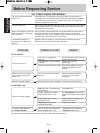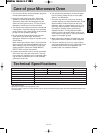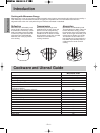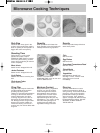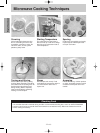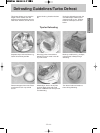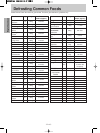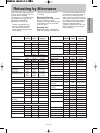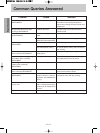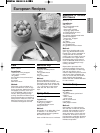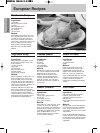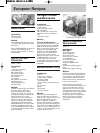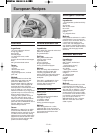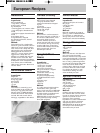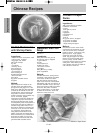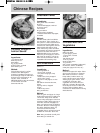
English Cookbook
English Cookbook
- En-17 -
Common Queries Answered
Problem Cause Solution
Food cools quickly after being Food not cooked through. Put back in oven for extra time.
MICROWAVED. Remember foods at fridge temperature
require more cooking time than food at room
temperature.
Soup/Casserole boils over after Container too small. For liquid foods use container twice the
cooking by MICROWAVE. volume of food.
Food cooks too slowly when cooked Oven not receiving correct Oven should be on a separate 13 amp circuit.
by MICROWAVE. power.
Food temperature from fridge Extra time required for cooking colder foods.
colder than room temperature.
Meat is tough when cooked by Power setting too high. Use reduced power level for meats.
MICROWAVE.
Meat salted before cooking. Do not salt before cooking. Salt if necessary
after cooking.
Cakes remain uncooked in center Too short cooking and/or Add extra cooking time/standing time.
when cooked by MICROWAVE. standing time.
Scrambled or poached eggs tough Cooking time too long. Take care cooking small quantities of eggs,
and rubbery when cooked by once spoiled they cannot be saved.
MICROWAVE.
Quiche/Egg custards tough and Power level too high. Use reduced power levels for these items.
rubbery when cooked by
MICROWAVE.
Cheese sauce tough and stringy Cheese cooked with sauce. Add at the end of cooking time, the heat of
when cooked by MICROWAVE. the sauce will melt the cheese.
Vegetables are dry when cooked by Cooked uncovered. Low Cover with a lid or cling film. Add extra
MICROWAVE. moisture content e.g. old root 2-4 tbsps of water. Slat after cooking.
vegetables. Salt added before
cooking.
Condensation appears on the door This is normal and means the Wipe condensation off with a soft cloth.
of your oven. food is cooking faster than the
moisture can be expelled from
the oven.
Turntable rotates in both directions. This is normal.



